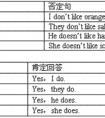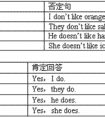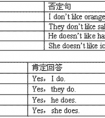选词填空。1.Iamlost.istheHolidayHotel, please ?(Where, What)2.canwegettothepark ?(What, How)3.Wewaitedthechair.(on, in)4.WhereyougoingnextSunday ?(were,-六年级英语
题文
| 选词填空。 |
| 1. I am lost. is the Holiday Hotel, please ? (Where, What) 2. can we get to the park ? (What, How) 3. We waited the chair. (on, in) 4. Where you going next Sunday ? (were, are) 5. My backpack is than yours. (big, bigger) |
答案
| l. Where 2. How 3. on 4. are 5. bigger |
据专家权威分析,试题“选词填空。1.Iamlost.istheHolidayHotel, please ?(Where, Wh..”主要考查你对 疑问副词,规则形容词的比较级,介词,系动词 等考点的理解。关于这些考点的“档案”如下:
疑问副词规则形容词的比较级介词系动词
考点名称:疑问副词
- 疑问副词:
用来引导特殊疑问句,表示时间,地点,方式,原因等,常见的有:when,where,how,why等。
分类:
时间副词:now, then, yesterday, always, already, soon
地点副词:here, home, upstairs, nowhere, above, near, beyond
方式副词:多数是形容词加上ly构成的,和一些well, fast, quick, slow, hard, alone, straight, wide
在加词尾ly时要注意:
(1)辅音+le:simple→simply, gentle→gently,
(2)以ic结尾的词:classic→classical但是public→publicly
(3)以辅音读音是[i]的y结尾的词:easy→easily
(4)特例:full→fully, whole→wholly, true→truly
程度副词,连接副词,关系副词
much, enough, quite, hardly, almost, deeply
疑问副词连接副词,关系副词:
how,who,where - 疑问副词在句中的位置及用法举例:
由于疑问副词后接疑问句,因此这些副词一般都位于句首。例如:
How do you go to school? 你怎么去上学?
Why do you dislike the game? 为什么你不喜欢这个游戏? - 疑问代词和疑问副词区别:
1. 疑问代词做对陈述句的主语,宾语或定语提问,即做句子的主语,宾语或定语, 如:
what, who/ whom, whose.
eg. Who is talking ?
What can you see?
Whose shirt is this?
2.疑问副词对时间,地点,方式等状语提问,如:
when, where, how 等.
eg. When is your birthday?
Where are you going?
How do you know?
考点名称:规则形容词的比较级
- 当我们需要对事物作出比较时,需要用到比较级。
比较级的句子结构通常是:
什么 + 动词be (am , is , are ) + 形容词比较级 + than(比)+ 什么 ,意为:“比……更……”。 如:
I’m taller and heavier than you. (我比你更高和更重。)
An elephant is bigger than a tiger. (一只大象比一只老虎更大。) - 形容词的比较级变化规则:
形容词的比较级是在形容词的基础上变化而来的,规则形容词的比较级变化规则是:
① 一般的直接在词尾加er ,如 tall - taller , strong - stronger ,
② 以e结尾的,直接加r ,如 fine – finer ,
③ 以辅音字母加y结尾的,先改y为i再加er,如funny - funnier
④ 双写最后的字母再加er,如big – bigger, thin – thinner ,
hot – hotter
下表举例列举一些形容词的原级和比较级。
原级 比较级 long longer large larger dry drier big bigger hot hotter
考点名称:介词
- 介词:
是用来表示它后面的名词(代词)或起名词作用的短语、从句与句中其他成分之间的关系。
介词是英语中很活跃的词,一般置于名词之前。它常和名词或名词性词语构成介词短语。
同一个介词常和不同的词语搭配形成固定搭配,表示不同意义。 介词分类:
一、表示地点位置的介词
(1)at, in, on, to, for
at 表示在小地方;表示“在……附近,旁边”。
in 表示在大地方;表示“在……范围之内”。
on 表示毗邻,接壤,“在……上面”。
to 表示在……范围外,不强调是否接壤;或“到……”。
(2)above, over, on 在……上
above 指在……上方,不强调是否垂直,与below相对;
over 指垂直的上方,与under相对,但over与物体有一定的空间,不直接接触。
on 表示某物体上面并与之接触。
例:The bird is flying above my head. 小鸟在我的头上飞。
There is a bridge over the river. 在河上有一座桥。
He put his watch on the desk.他把他的表放在了桌子上。
(3)below, under在……下面
under 表示在……正下方
below 表示在……下,不一定在正下方
例:There is a cat under the table. 桌子底下有一只猫。
Please write your name below the line. 请在横线下写上你的名字。
(4)beside,behind beside 表示在……旁边
behind 表示在……后面
二、表示时间的介词
(1)in,on,at在……时
A、in表示较长时间,如世纪、朝代、时代、年、季节、月及一般(非特指)的早、中、晚等。
- 最新内容
- 相关内容
- 网友推荐
- 图文推荐
| [家长教育] 孩子为什么会和父母感情疏离? (2019-07-14) |
| [教师分享] 给远方姐姐的一封信 (2018-11-07) |
| [教师分享] 伸缩门 (2018-11-07) |
| [教师分享] 回家乡 (2018-11-07) |
| [教师分享] 是风味也是人间 (2018-11-07) |
| [教师分享] 一句格言的启示 (2018-11-07) |
| [教师分享] 无规矩不成方圆 (2018-11-07) |
| [教师分享] 第十届全国教育名家论坛有感(二) (2018-11-07) |
| [教师分享] 贪玩的小狗 (2018-11-07) |
| [教师分享] 未命名文章 (2018-11-07) |

![—— He'sneartheTVset (电视机).[ ]A.What'stheboydoing?B.Where'stheboy?C.Whoistheboy?-三年级英语](http://www.00-edu.com/d/file/ks/4/1/38/2019-08-19/smalla98d03e1cd1ad5f1eea83d4f5e418fe61566228470.jpg)
![_________ didyou_________?[ ]A. Where; wentB. Where; goC. What; went-六年级英语](http://www.00-edu.com/d/file/ks/4/1/38/2019-08-19/small4cca8e85fae1eda0cb114208d0da83c91566228121.jpg)



